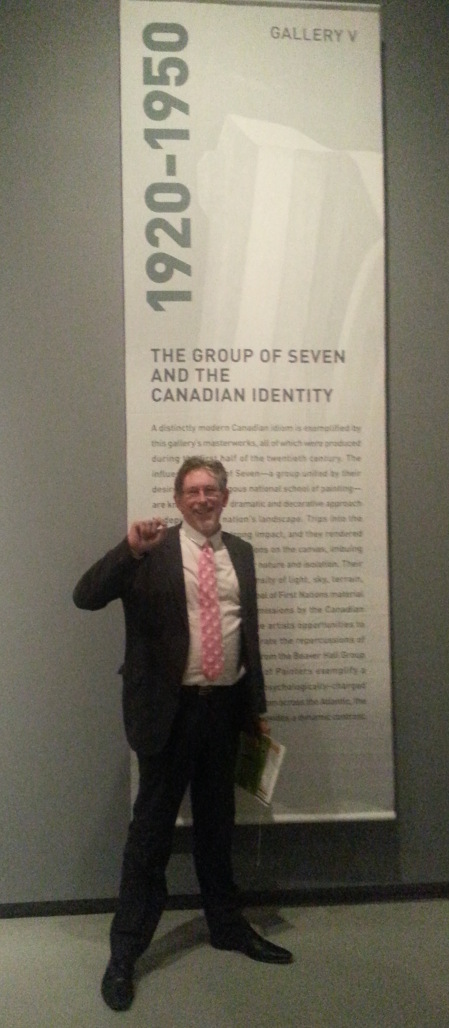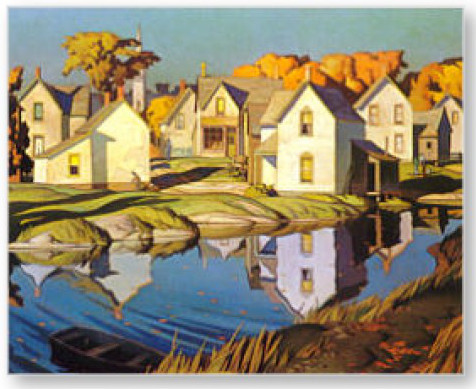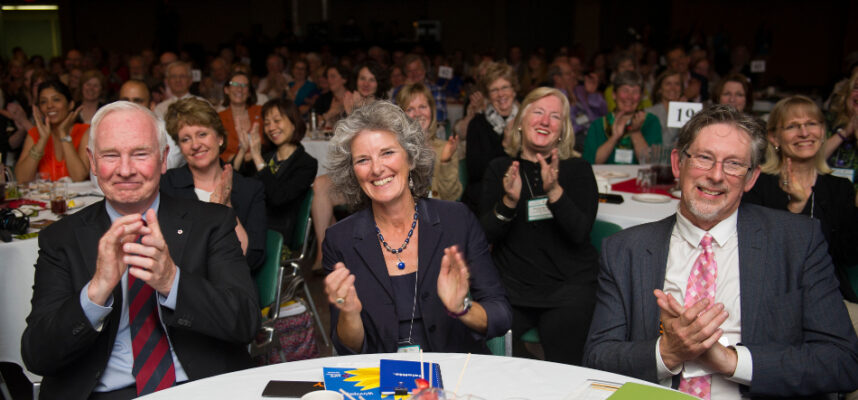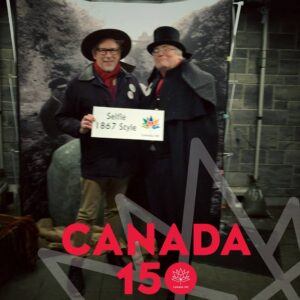14 Jan 2014
0 CommentsThe Group of Seven – Nation Building for the 21st Century
Last year, I signed up for a wonderfully ambitious initiative spearheaded by our Governor General, His Excellency David Johnston. I was invited to join a Group of Seven who will serve as catalysts to rolling out David Johnson’s vision of a Smart and Caring Nation built by a set of Smart and Caring Communities, ultimately aimed to be a major national initiative to commemorate Canada’s 150th birthday, or sesquicentennial, in 2017.
I was very much honoured to be asked and, although it is a dauntingly large not to mention a somewhat unspecified, goal, as a proud Canadian who knows first hand David Johnston’s unique ability to lead and motivate, I quickly agreed to this call. I’ll share more about this initiative in order to seek your input. Since no small group can be representative of our huge and diverse nation, it is important the we engage in much dialogue from Canadians of all ages and demographic profile, in order to achieve maximum impact and relevance.
As a way to start that conversation, I’d like to share some of my perspectives on Smart and Caring 2017.
David Johnston’s Smart and Caring Vision:
This whole project starts with a great foundation in our Governor General’s Smart and Caring vision for Canada. And here is why his singular leadership is so critical to this initiative.
David Johnston has a long track record of motivation. Back in 2006, as President of Unviersity of Waterloo, he challenged the already ambitious and successful business, community and government leaders in Waterloo Region to reach even higher. Issued in November 2006, his Ten Goals to Make Waterloo Region Canada’s Knowledge Capital are a blueprint that inspired and motivated real change and continue to have an impact today.
Similarly, on 1 October 2010 at his installation speech as Governor General in the Senate Chambers in Ottawa, David Johnston laid out his vision for nation building in Canada, challenging us to build a Smart and Caring Nation:
“We are a Smart and Caring Nation.
A nation where all Canadians can grow their talents to the maximum.
A nation where all Canadians can succeed and contribute.
But there is much work to be done to fully achieve our vision of a Smart and Caring Nation. I believe it is essentialTo support families and children,
To reinforce learning and innovation, and
To encourage philanthropy and volunteerism.”
To build on that vision as we near the sesquicentennial of Canada as a country in 2017, His Excellency has challenged Community Foundations of Canada and the growing network of 191 grass roots Community Foundations across our country. He wants them to lead a groundswell movement, in each and every community and nationally, for Smart and Caring 2017.
Canada – A History of Evolutionary Nation Building:
With that vision as inspiration, and as a passionately proud Canadian, here is my perspective on Canada as a nation. We were not formed by revolution, as is the case in many other countries like the USA or France. True to our character, our particular style of nation-hood opted instead for evolution at a slow almost glacial pace. You might almost say that Canada pioneered nation building by committee. Specifically, a series of meetings commencing with the Charlottetown Conference, 150 years ago in 1864, led to Confederation on 1 July 1867.
I would argue that, as a nation, we were more defined by what we were not — ie. no tea parties or revolutions to overthrow a king. Instead, via peaceful change we enjoyed a tabula rasa upon which to architect a unique nation in those lands north of the growing United States of America. The process was slow. We remained essentially a colony with large parts of the country feeling more British than Canadian for many years. Consider how long it took us to have a non-British Governor General (Vincent Massey, 1952), our own flag (1965, replacing the Union Jack) or our own constitution (repatriated from Westminster in 1982).
Until the late 20th century, innumerable British colonial vestiges remained. Many people argue that Canadian heroism and sacrifices for the motherland in World War I, just 100 years ago, started the modern trend of a strengthening Canadian identity both internally and as a nation on the global stage.
 Shortly after WWI, an influential group of painters, the original Group of Seven artists, created a truly Canadian vision of our country through direct contact with nature and our awe-inspiring landscape. Their work was notably distinct from the prevailing British styles of Turner, Constable and later British or European artistic styles.
Shortly after WWI, an influential group of painters, the original Group of Seven artists, created a truly Canadian vision of our country through direct contact with nature and our awe-inspiring landscape. Their work was notably distinct from the prevailing British styles of Turner, Constable and later British or European artistic styles.
Canada’s Centennial in 1967 marked a major inflection point for Canada. We had come through two world wars with a strong sense of national identity, supported by the burgeoning post war economy. Canada proudly led on the world stage with the likes UN Peacekeeping, Expo ’67 in Montréal and the uber cool federalist Prime Minister Pierre Elliot Trudeau.
Set right in the middle of the swinging 1960’s, our centennial celebrations in 1967 were a wonderful time to be alive. Besides Expo ’67 and the quaint historical “centennial” costumes people wore, today we are left with innumerable Centennial arenas, parkways, libraries, etc. These major investments in infrastructure are present with us today. I recall that time with pride and fondness.
CFC Smart and Caring Project:
Because the 21st Century seems so different than the previous, what kind of movement should honour Canada’s 150th birthday. It is a complex question, but I believe that if we can mobilize almost all communities across Canada into activities and projects inspired by the “Smart and Caring” mantra, like a national pot luck dinner we would effectively crowdsource some of national, and even, international significance.
Once again, we have a unique opportunity to make positive changes while setting a positive example for the world.
It is important to understand that, because each and every community is unique, communities must have the freedom to launch initiatives that directly suits their unique needs. Nonetheless, with diverse initiatives considered collectively, I believe that, taken as a whole we can shape and inspire the Canada of the future. We have so many advantages and the time is right to embark of nation building for the 21st century.
I would further hope that we would see collective action and partnership, both at the community level and national level, to increase the impact and effectiveness of the Smart and Caring 2017 initiatives. We must speak to and be meaningful to all Canadians:
- young and old
- recent immigrants or multi-generational Canadians
- from east to west to the most northern reaches
- Aboriginal, English, French or any other heritage
Because no group, no matter how large, can be sufficiently inclusive, that is why it is absolutely imperative that we, who have been honoured to help make this happen, hear from as many Canadians as possible.
Please weigh in here with comments or find other ways to get involved. And, I hope to provide more updates and opportunities to engage, participate, shape and drive Canada’s 150th birthday celebrations – Smart and Caring 2017.Please start by sharing your thoughts on what Smart and Caring 2017 means to you.


29 Jun 2017
0 CommentsCanada at 150 – What is Your Gift to Canada and the World?
As we approach Canada Day of our 150th year of Confederation, I am compelled to share my personal reflections on where our country is headed, how the lessons of history (positive or negative) are shaping our future journey and the contribution we, as Canadians, can make to our world. Beyond celebration, our nation urgently needs our care and attention. As a result, I am sharing my own journey in the form of a call to action.
Over four years ago, I received a call join a group helping to build programs to shape our Canadian sense as a “Smart and Caring Nation”, inspired by His Excellency Governor General David Johnston. My love of our country has been inexorably shaped and enhanced through extended periods of living and working abroad. The opportunity to serve Canada and to collaborate with an unbelievably talented group of leaders, made it a no-brainer for me to accept this call. Since then, in many varied groupings, conversations about Canada and nation-building were convened at Banff Centre for Arts and Creativity, the Deloitte Greenhouse, Wasan Island and more. Although not apparent from the core group shown below, a diverse and impactful group of individual leaders, first nations, national and local institutions, and many change makers from the charitable and NGO sector coalesced to help shape and expand this initiative. I am eternally thankful for the leadership of David Johnston and Community Foundations of Canada, for their leadership in starting these conversations. My investment of time and money has been returned many times over in my own knowledge and engagement.
Once these high level priorities were identified, many participants contributed to shaping thinking, leading to great initiatives such as the Alliance 150 to increase collaboration and partnership among organizations. And, as Federal and Provincial governments got onboard, these earlier efforts were foundational, setting the agenda for much of the current governmental and NGO work for Canada’s 150th. As we closed in on 2017, I channelled my focus to advising a number of national Canada 150 Signature Initiatives, such as Canada C3 and Canada 150 in our local communities, that directly descends from those early conversations.
As an Ambassador for the Canada C3 expedition, I am excited to see this project’s ambitions surpassed on all its major themes of Reconciliation, Youth Engagement, Inclusion & Diversity and Environmental Stewardship. Watch this nation building exercise grow during the Expedition as it reaches the majority of Canadians. I will use my time on Leg 7 of Canada C3, later this summer, to learn, engage and reflect collaboratively regarding our major Canadian challenges and opportunities.
My biggest take away from this process, is that it is important for Canadians, individually and collectively, to work on nation building. Unsurprisingly, David Johnston said it best in a letter “What Will Your Gift Be?”, from his recent book The Idea of Canada – Letters to a Nation. Note that the proceeds from this wise work are directed to building the Rideau Hall Foundation which is another legacy of our current Governor General. In that letter:
People around the world look to Canada as a bastion of democracy, decency and safety, buttressed by our reputation for being obsessively obsequious and our pioneering of international peacekeeping. As times change, our national role and aspirations also need to change. Just as we are no longer the extension to Victorian Great Britain of a 100 years ago, our post World War II Cold War era identity also needs to be re-imagined. What will Canada look like for our bicentennial in 2067? 2017 represents a unique and timely opportunity for us to all participate in shaping our common future.
In 2017, man y forces threaten the comfortable status quo that we expect from Canadian society. Those who are privileged to lead, indeed everyone, must take these forces seriously. Mass alienation and discontent with our current civil order represents a real cry for change. However, many times those grasping for change latch onto leaders whose seductive rhetoric proves ultimately destructive of the enviable civil society we have built over 150 years here in Canada.
y forces threaten the comfortable status quo that we expect from Canadian society. Those who are privileged to lead, indeed everyone, must take these forces seriously. Mass alienation and discontent with our current civil order represents a real cry for change. However, many times those grasping for change latch onto leaders whose seductive rhetoric proves ultimately destructive of the enviable civil society we have built over 150 years here in Canada.
A country is, indeed, the product of the collective hopes, dreams and ideals of its citizens. As John F Kennedy famously said,
Yet, sometimes our daily news feeds chronicle the disturbing forces that appear to denigrate all that Canadians hold dear, such as:
The more I travel and engage with global thought leaders, I learn that Canada is becoming the last bastion of a better way in the world. As a result, I believe those key Canada 150 themes of Reconciliation; Inclusion; Youth Engagement and Environmental Stewardship have escalated in importance from nice to have to social imperatives.
For individual Canadians, using 2017 as a springboard towards a “Smart and Caring” Nation in 2067, there are innumerable ways to make a difference with some combination of the trinity of “wealth“, “wisdom” and “work” focused on civic, social and cultural needs:
Besides being amongst the most fulfilling work you will do in your life, your civic engagement will continue to help shape and grow the wonderful social and cultural fabric of this wonderful country we call Canada.
I have been inspired to continually re-think my gift to Canada, and now see it more of a journey than a destination. Stay tuned …
What is your gift to Canada? Are you prepared to do your part?